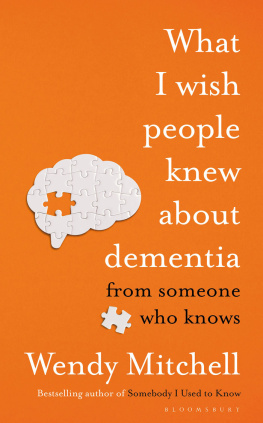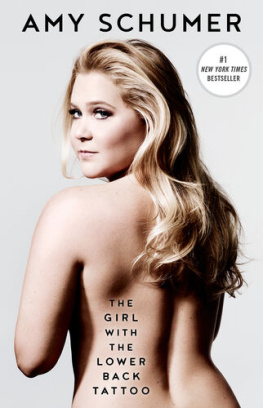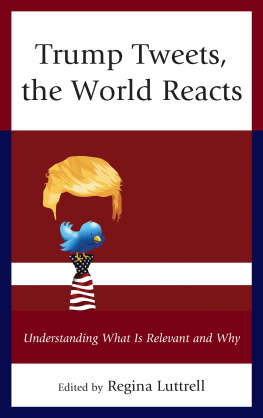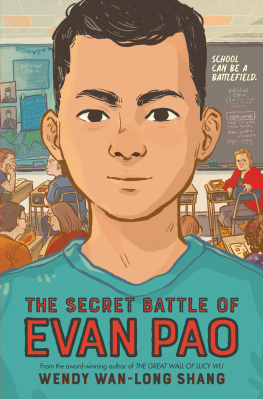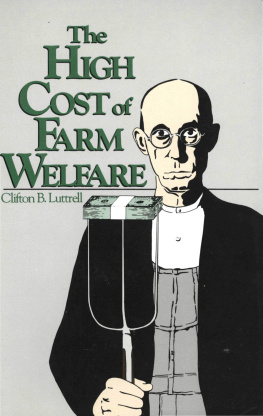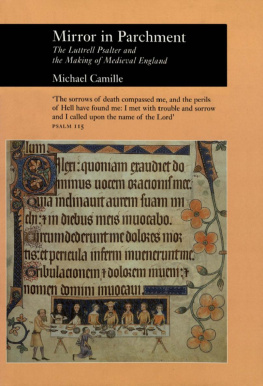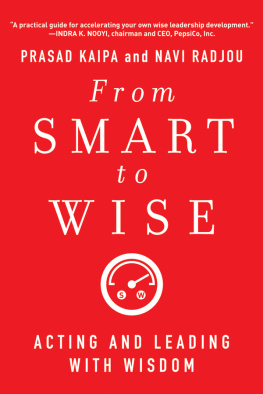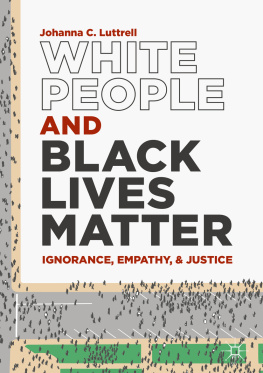Schoolsmart
and Motherwise
PERSPECTIVES ON GENDER
Series Editor:
Myra Marx Ferree, University of Connecticut
Pleasure, Power, and Technology: Some Tales of Gender, Engineering, and the Cooperative Workplace
Sally Hacker
Black Feminist Thought: Knowledge, Consciousness, and the Politics of Empowerment
Patricia Hill Collins
Understanding Sexual Violence: A Study of Convicted Rapists
Diana Scully
Maid in the U.S.A.
Mary Romero
Feminisms and the Women's Movement: Dynamics of Change in Social Movement Ideology and Activism
Barbara Ryan
Black Women and White Women in the Professions: Analysis of Job Segregation by Race and Gender, 19601980
Natalie J. Sokoloff
Gender Consciousness and Politics
Sue Tolleson Rinehart
Mothering: Ideology, Experience, and Agency
Evelyn Nakano Glenn, Grace Chang, and Linda Rennie Forcey (editors)
For Richer, For Poorer: Mothers Confront Divorce
Demie Kurz
Rock-a-by Baby
Verta Taylor
Schoolsmart
and Motherwise
Wendy Luttrell
Working-Class
Womens Identity
and Schooling
First published 1997 by Routledge
Published 2016 by Routledge
2 Park Square, Milton Park, Abingdon, Oxon OX14 4RN
711 Third Avenue, New York, NY 10017, USA
Routledge is an imprint of the Taylor & Francis Group, an informa business
Copyright 1997 by Routledge
All rights reserved. No part of this book may be reprinted or reproduced or utilised in any form or by any electronic, mechanical, or other means, now known or hereafter invented, including photocopying and recording, or in any information storage or retrieval system, without permission in writing from the publishers.
Notices
Practitioners and researchers must always rely on their own experience and knowledge in evaluating and using any information, methods, compounds, or experiments described herein. In using such information or methods they should be mindful of their own safety and the safety of others, including parties for whom they have a professional responsibility.
Product or corporate names may be trademarks or registered trademarks, and are used only for identification and explanation without intent to infringe.
Library of Congress Cataloging-in-Publication Data
Luttrell, Wendy.
Schoolsmart and motherwise: working-class women's identity and schooling/Wendy Luttrell.
p. cm.
Includes bibliographical references (p.) and index.
ISBN-13: 978-0-415-91012-5 (pbk)
1. Adult education of womenSocial aspectsUnited States.
2. Group identityUnited States. 3. Feminism and educationUnited States.
4. Working class womenUnited StatesBiography. 1. Title.
LC1663.L88 1997
| 371.8220715-dc21 | 96-39655
CIP |
[Contents]
for Robert, Mikaela, Liam, and Emma
My biggest debt is to the women who shared their stories and trusted me to make final decisionsfor better or worseabout representing their lives. This book does not adequately convey, but has greatly benefited from, many impromptu conversations, gifts, moments of reflection and reconsideration, the willingness to be interviewed yet one more time for all these extensions of good will, I am grateful.
I was fortunate to have my research financially supported by two separate awards. First, an award from the Rockefeller Foundation allowed me, as a Humanist in Residence at the Duke/University of North Carolina Center for Research on Women, to immerse myself in data analysis. Second, an award from the American Council of Learned Societies gave me respite from teaching summer school to finish the manuscript.
I have also had the benefit of working in a setting that provided invaluable intellectual and personal resources. I would like to acknowledge Jean OBarr, Director of Womens Studies, Duke University, for creating and sustaining a space for feminist teaching and learning. I am especially indebted to Naomi Quinn, whose leadership of the Cultural Anthropology department enriched my life in inestimable ways. Through her mentoring and institutional advocacy on my behalf I have learned to better recognize my own voice and value. I cannot thank her enough.
Numerous Duke University students brought fresh insight and energy to this project; indeed, one of the most invisible (and hence devalued) kinds of scholarship arises from classroom discussions when students ask clarifying questions about ones research. This book has profited enormously from such classroom exchanges and I wish there was a way to personally acknowledge each student. I could not have completed the book without the help of two graduate student research assistants, Ingrid Byerly and Katherine Murawski, whose endless trips to the library freed me up to write. I am especially grateful to Katherine for her shepherding this book through numerous revisions and edits. She was unruffled by my hectic schedule, always efficient, and ever willing to xerox one more copy of the manuscript.
Many people contributed to the ideas presented in this book, offering encouragement and crucial advice along the way. I want to first acknowledge the members of my dissertation committeePam Roby, Carole Joffe, and Hardy Fryewho mentored me through the first stage of this research and whose support was paramount in my development. I am deeply indebted to those who read and provided critical comments on the entire manuscript: Katherine Borman, Arlene McLaren, Myra Marx Ferree, Naomi Quinn, Mary Rogers, Robert Shreefter, Jean Stockard, and John Wilson. I am also grateful to those who read parts of the manuscript: Jessica Benjamin, Nancy Chodorow, Deborah Dwork, and Dorothy Holland, and to those whose comments on papers or responses to presentations made me think about my research in new ways: Kathryn Anderson-Levitt, Ann Bookman, Francesca Cancian, Susan Chase, Bette Dickerson, Doug Foley, Mary Hawkesworth, Nancy Hewitt, Miriam Johnson, Bradley Levinson, Sandra Morgen, Rachel Rosenfeld, Carol Stack, Claudia Strauss, Edward Tiryakian, Lois Weis, Julia Wrigley, and Gay Young.
Special thanks are due to Myra Marx Ferree, editor of the Perspectives on Gender Series at Routledge. It was an exhilarating moment when she approached me after I had presented a paper and said, Is someone already publishing your book? (I am writing a book? I thought to myself.) Her belief in my work has sustained me during the hardest of times. She has nurtured so many women sociologists and I feel honored to be one of them. Jayne Fargnoli was the editor at Routledge who enthusiastically took on this project and I regret that she was unable to see her initial investment of energy come to fruition. I appreciate the excellent help of Routledge Press personnel: Anne Sanow, Alex Mummery, and Karen Deaver, who all contributed to the final product.
Several people were instrumental in making my prose more reader-friendly and whose allergy to jargon (Sherryl Kleinmans phrase) inspired me to keep rewriting. I thank members of my writing group: Jane Brown, Marcy Lansman, Fabienne Worth, Sarah Shields, and Sherryl Kleinman for listening with kind but critical ears to the worst of it. Their feedback spurred and sustained me during the books final stages. Mary Rogers was more than generous with her time and green pen. She helped me in more ways than she will ever know. Lori Patel copy edited the book; she was the person who gave me the courage to give it up in the last hours with her reassuring suggestions.



